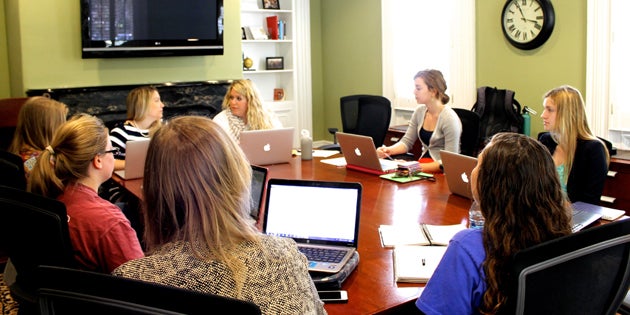Do high sodium beverages increase rehydration after exercise? How does a mouthpiece affect sport performance? College of Charleston health and human performance students researched these questions and more, and will present their findings on April 24, 2014, from 4:30 until 6:45 p.m. in rooms 206 and 207 of the F. Mitchell Johnson Physical Education Center (30 George St.).
 Professor Wes Dudgeon worked with exercise science majors Ashton Medlin and Susannah Murray to map heart rates during golf. Dudgeon says, “Research has shown that golf, primarily walking, can have beneficial health outcomes. However, from a scientific perspective we still do not have objective data about why/how these benefits are occurring. The purpose of this study is to measure heart rate while also recording step rate, and changes in altitude, to better predict caloric expenditure during a round of golf.”
Professor Wes Dudgeon worked with exercise science majors Ashton Medlin and Susannah Murray to map heart rates during golf. Dudgeon says, “Research has shown that golf, primarily walking, can have beneficial health outcomes. However, from a scientific perspective we still do not have objective data about why/how these benefits are occurring. The purpose of this study is to measure heart rate while also recording step rate, and changes in altitude, to better predict caloric expenditure during a round of golf.”
Each student or student team was mentored by a professor, and the hope is that some of the research will be published in academic journals.
“I really think we have exceptional students in the Department of Health and Human Performance,” states Dr. William Barfield, a professor within the department who is co-organizing the event. “The HHP faculty is really honored that we have the opportunity to work with young, bright, motivated, young people.”
Several teams of students tackled public health issues, like long-acting reversible contraception (LARC), while others focused on sport performance, like the effects of marathon training on inflammatory markers in young adults.
RELATED: College seniors are raising awareness about health issues – and earning credit.
The Department of Health and Human Performance offers majors in athletic training, exercise science, physical education, teacher education, and public health, as well as minors in health and coaching.




